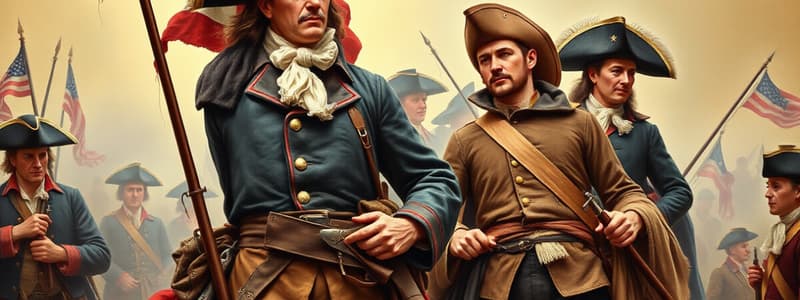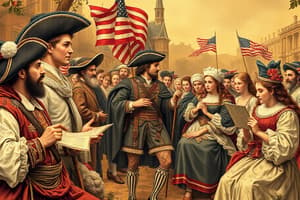Podcast
Questions and Answers
Who was Benjamin Franklin?
Who was Benjamin Franklin?
Patriot inventor and politician who helped negotiate French support for the American Revolution.
What role did Col. Francis Smith play in the American Revolution?
What role did Col. Francis Smith play in the American Revolution?
Loyalist member of the British military ordered to seize Patriot weapons and leaders in Concord, Massachusetts.
Who was Col. William Prescott?
Who was Col. William Prescott?
Patriot leader at the Battle of Bunker Hill in 1775.
Who is Gen. Benedict Arnold?
Who is Gen. Benedict Arnold?
What is Gen. Ethan Allen known for?
What is Gen. Ethan Allen known for?
Who was Gen. Thomas Gage?
Who was Gen. Thomas Gage?
What was John Hancock's role in the American Revolution?
What was John Hancock's role in the American Revolution?
What did Thomas Jefferson do?
What did Thomas Jefferson do?
Who authored 'Common Sense'?
Who authored 'Common Sense'?
Who was William Dawes?
Who was William Dawes?
What were the actions of the 2nd Continental Congress?
What were the actions of the 2nd Continental Congress?
What is a boycott?
What is a boycott?
What is an effigy?
What is an effigy?
Who were the Green Mountain Boys?
Who were the Green Mountain Boys?
Who were the Loyalists?
Who were the Loyalists?
What were the Minutemen?
What were the Minutemen?
What was the Olive Branch Petition?
What was the Olive Branch Petition?
Who were the Patriots?
Who were the Patriots?
What does it mean to repeal a law?
What does it mean to repeal a law?
What were the Sons of Liberty?
What were the Sons of Liberty?
What are writs of assistance?
What are writs of assistance?
What happened at Bunker Hill?
What happened at Bunker Hill?
What was the significance of Concord, Massachusetts?
What was the significance of Concord, Massachusetts?
What happened at Fort Ticonderoga?
What happened at Fort Ticonderoga?
What happened in Lexington, Massachusetts?
What happened in Lexington, Massachusetts?
Flashcards are hidden until you start studying
Study Notes
Key Figures in the American Revolution
- Benjamin Franklin: Influential patriot, inventor, and politician; instrumental in securing French support during the American Revolution.
- Col. Francis Smith: British Loyalist officer tasked with seizing Patriot resources and leaders in Concord, Massachusetts.
- Col. William Prescott: Notable Patriot leader during the significant Battle of Bunker Hill in 1775.
- Gen. Benedict Arnold: Initially a hero for the Patriot cause, he became infamous for his betrayal in a plot to hand over Fort West Point to the British.
- Gen. Ethan Allen: Commander of the Green Mountain Boys; successfully captured Fort Ticonderoga, securing vital artillery for the revolution.
- Gen. Thomas Gage: Loyalist British general who held control over Boston after the Boston Tea Party.
- John Hancock: Prominent Patriot and president of the Second Continental Congress; known for his bold signature on the Declaration of Independence.
- Thomas Jefferson: Key delegate from Virginia; principal author of the Declaration of Independence.
- Thomas Paine: Influential writer; authored "Common Sense," a pamphlet advocating for independence from Britain.
Significant Events and Concepts
- 2nd Continental Congress: Organized to govern the colonies; notable actions included sending the Olive Branch Petition, establishing the Continental Army with George Washington at its helm, and drafting a declaration of independence.
- Boycott: A method of protest where colonists refused to purchase British goods as a form of resistance against oppressive laws.
- Effigy: Symbolic representation used to mock figures seen as antagonistic, particularly by the colonists against British officials.
- Green Mountain Boys: Militia group from Vermont credited with the successful capture of Fort Ticonderoga.
- Loyalists: Colonists who remained loyal to the British crown and resisted the revolutionary movements.
- Minutemen: Members of colonial militias trained to be ready to fight at a moment's notice, typically within sixty seconds.
- Olive Branch Petition: A last diplomatic effort to maintain peace, sent to King George III by the Second Continental Congress.
- Patriots: Colonists supporting independence from Britain; core group fighting in the Revolutionary War.
- Repeal: The act of revoking or canceling a law or legislative act.
Military Engagements
- Sons of Liberty: An activist group led by Samuel Adams using various methods, including protests and boycotts, to oppose British measures like the Stamp Act.
- Writs of Assistance: General search warrants enabling British customs officials to enter and search private properties for smuggled goods.
- Bunker Hill: A pivotal battle demonstrating colonial resilience; while the British secured victory, they suffered significant casualties.
- Concord, Massachusetts: A critical location for Patriot arms and munitions; targeted by British forces aiming to suppress the rebellion.
- Fort Ticonderoga: Site of a surprise attack by Ethan Allen’s troops, resulting in the capture of important artillery for the American cause.
- Lexington, Massachusetts: Notable for being the site of the war's first shots, where local militias confronted British troops to protect Patriot supplies.
Studying That Suits You
Use AI to generate personalized quizzes and flashcards to suit your learning preferences.




